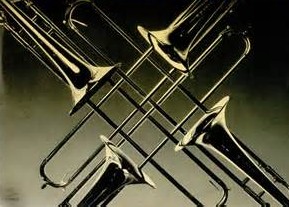That Musician’s Wellness of North America, L.L.C. has been established by Jan Kagarice, is no surprise. Kagarice has made a career out of teaching some of the very healthiest trombone players from around the world as part of the trombone faculty at the University of North Texas, but has also made a specialty out of helping those who had been injured or needed to overcome some form of limitation. Jan is no stranger to medical issues, and having to resolve them to continue to play trombone is part of her character. In the same way, performing as the bass trombonist of the successful PRISMA trombone quartet helped her to coach a number of award winning trombone quartets from UNT. Part of a team of teachers, a concept growing among applied studios at upper division institutions, Jan’s diverse experiences as a musician and a human being have sharpened and deepened her to help others-which she seems to love to do. Come along as Jan Kagarice shows Seven Position something about teamwork, keeping it simple, and staying healthy. Enjoy!
1. What do you look for in a horn?
One that resonates easily and has good flexibility throughout the range.
 2. What were your teaching style and objectives like before you had medical challenges as compared with afterwards?
2. What were your teaching style and objectives like before you had medical challenges as compared with afterwards?
I have a form of muscular dystrophy and a rare neurological disorder. Neither of which are life threatening but certainly caused me to learn about efficiency and healthy function.
My objectives in guiding musicians has ALWAYS been about the music. I believe that the music itself is the teacher. My students call me “coach”. I’m just coaching their focus of attention to the music, pretty easy gig! When a player has physical issues that interfere with performance, I assist them is becoming more efficient. doing LESS. That’s why they are called “LESSons”
3. What makes a multi-teacher applied studio approach work at the university level? What are the advantages and disadvantages of the single teacher versus the team?
I think that a team approach has enormous benefits, if the team is working together and each student has a “home base” studio. However, if this approach is not clearly structured or if faculty become competitive with each other, this is non-cooperative and really unfortunate and unhealthy for the students in that environment. (Dr. Noel Wallace wrote an excellent dissertation about the team approach within the trombone studio at Codarts: Rotterdam that brought about the New Trombone Collective and MANY incredible trombonists/musicians).
 A single teacher can more easily guide a studio in a certain direction and can certainly bring in other professionals of their choosing. I would also assume that single teacher is more likely to seek collaboration across their department, which can be of great benefit for all.
A single teacher can more easily guide a studio in a certain direction and can certainly bring in other professionals of their choosing. I would also assume that single teacher is more likely to seek collaboration across their department, which can be of great benefit for all.
4. What is your secret to a great legato?
Great concept of legato and excellent air flow. Over instruction of this on the trombone is detrimental in my opinion. There are excellent models out there and it is best to copy by ear.
5. What have been your favorite “unexpected” uses or niche for the bass trombone?
I am not sure what you mean by this question, sarcasm says, “a lamp”. Honest: George Roberts in Nelson Riddle’s band. Not unexpected, but the excellence of time, pitch, balance and feel make you notice! Dave Taylor plays Daniel Schnyder. Again, it’s about musical communication.
And to add a twist: Least favorite but expected: ego-driven bass trombonists in orchestral settings.
“Janet”, Performed by Maniacal Four Trombone Quartet in dedication to Jan
6. It has been said that people “play their personality”. How much of a compelling factor for a performer is the character, humanity and temperment that infuses the performer?
I agree with the statement completely, but it is also important for the performer to not let their personality overshadow the expression of the composer brought to life.
 7. What are some of your favorite memories as a performer?
7. What are some of your favorite memories as a performer?
Easy! Every performance with PRISMA (trombone quartet), especially Cleveland ITF (1993 for the young folks!)
8. How do you view chamber music opportunities for bass trombonists? What were your experiences?
Chamber Music is extremely important for all musicians. Bass trombonists in trombone quartets need to be sure to play some inner parts every once in a while so that it transfers when you play with a tuba in a larger ensemble. I played a LOT of sackbut as a younger player and enjoyed early music immensely. I felt that it helped me to become a better musician. I then played a LOT of brass quintets at New England Conservatory. Chamber Music experience helped me adapt to every other ensemble. I encourage all of my students to immerse themselves in different genres of music. It will make them a better player, more marketable, but also keep their career interesting!
c. 2016 David William Brubeck All Rights Reserved www.davidbrubeck.com
Interested in more “Seven Positions” Interviews?
Charlie VernonJames MarkeyChris BrubeckDoug YeoJeremy MorrowTom EverettGerry Pagano Ben van DijkRandall HawesDenson Paul PollardThomas MattaFred Sturm Bill ReichenbachMassimo Pirone Erik Van Lier Jennifer WhartonMatyas VeerStefan Schulz

